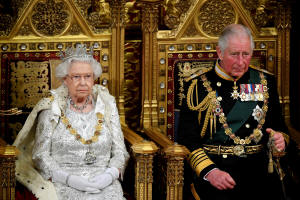King Charles to address a nation shaken by death of queen
 Send a link to a friend
Send a link to a friend
 [September 09, 2022]
By Michael Holden and Andrew MacAskill [September 09, 2022]
By Michael Holden and Andrew MacAskill
BALMORAL, Scotland (Reuters) - Britain's
King Charles will on Friday address a grieving nation following the
death of his mother Queen Elizabeth after seven decades on the throne,
as a period of national mourning began for the only monarch most Britons
ever knew.
Charles https://www.reuters.com/world/uk/
charles-britains-conflicted-new-monarch-2022-09-08,
who raced to be by the side of the queen at her Scottish home on
Thursday, was heading back to London with his wife Camilla
https://www.reuters.com/world/uk/
rottweiler-queen-consort-camillas-rise-shadow-diana-2022-09-08,
now Queen Consort, before meeting the prime minister and making a
televised statement.
The death of the queen https://www.reuters.com/world/uk/
obituary-elizabeth-queen-who-moved-with-changing-world-2022-09-08,
Britain's longest-reigning monarch https://www.reuters.com/world/uk/life-queen-elizabeth-2022-09-08
and a towering presence on the world stage for 70 years, has drawn
condolences from around the world.
Waking up to their first day without a woman once described by her
grandson Harry as "the nation's grandmother", members of the public
began gathering again outside Buckingham Palace and Windsor Castle to
lay flowers and take photos of the growing memorials.

Billboards across the city displayed messages of condolence and
newspapers ran front-page photo tributes to the queen.
Buckingham Palace said there would a period of mourning to be observed
by members of the family and the royal household until a week after the
funeral, the date of which has not yet been confirmed but is expected in
about 10 days time.
NATIONAL MOURNING
The government declared a period of national mourning which would
continue until the state funeral. An online book of condolence https://www.royal.uk/send-message-condolence
was also opened.
At the remote Balmoral Castle in Scotland where she died on Thursday and
where her family are gathered, people also arrived to pay their
respects.
"She was amazing. She was like everyone's granny. She always managed to
capture the mood with her words," said Kay McClement, 55, who came with
a friend to leave flowers at the castle.
Thousands also gathered at Buckingham Palace, the queen's home in
central London, to lay flowers outside the famous black railings.
"I brought my young daughter here, because even though she won't
remember it, we can tell her she was here as history was happening,"
said railway worker Liam Fitzjohn, 27. "She's all we ever knew, we will
never have a queen like that again."
The government said it expected large crowds to mass at royal
residences. "We expect significant crowding and delays on some public
transport," it's statement said.
Elizabeth was head of state of the United Kingdom and 14 other realms
including Australia, Canada, Jamaica, New Zealand and Papua New Guinea.
Charles, who automatically succeeded her as king, said the death was a
moment of great sadness for himself and his family.
"I know her loss will be deeply felt throughout the country, the Realms
and the Commonwealth, and by countless people around the world," the
73-year-old said in a statement.
He will meet Prime Minister Liz Truss on Friday afternoon before later
addressing the country.

[to top of second column]
|

Britain's Queen Elizabeth and Charles, the Prince of Wales are seen
ahead the Queen's Speech during the State Opening of Parliament in
London, Britain October 14, 2019. REUTERS/Toby Melville/Pool/File
Photo

There will be gun salutes at London's Hyde Park and at the Tower of
London and the bells at Westminster Abbey and St Paul's will toll.
At Windsor Castle, the Sebastopol Bell, captured during the 19th
Century Crimean War and which is only struck to mark the death of
the sovereign, will toll.
Regular business in parliament was replaced with a special session
for lawmakers to pay tribute to the queen. Parliament will also
convene on Saturday, something it rarely does, to approve a message
of condolence to the king.
Bereft of its symbol of continuity and resilience, Britain begins
its new era with a new king and new prime minister in grave economic
crisis and following years of political division.
Long-running industrial action sparked by surging inflation was
cancelled during the period of mourning. The BBC national
broadcaster said that "as a mark of respect" it had called off its
remaining 'Proms' concerts - whose patriotic, flag-waving finale was
due to take place on Saturday.
News that the queen's health was deteriorating emerged shortly after
midday on Thursday when a palace statement said she had been put
under medical supervision, prompting her family to rush to Scotland.
The queen had been suffering from what Buckingham Palace had called
"episodic mobility problems" since the end of last year, forcing her
to withdraw from nearly all her public engagements. Her husband of
73 years, Prince Philip, died in 2021.
Her last public duty came only on Tuesday, when she appointed Truss
prime minister - the 15th of her reign.
"She was the very spirit of Great Britain – and that spirit will
endure," Truss said outside her Downing Street office where the
flag, like those at royal palaces and government buildings across
Britain, was lowered.

MACRON'S MESSAGE
Condolences poured in from leaders around the world.
"To you, she was your queen. To us, she was the queen. To us all she
(will) be with us forever," French President Emmanuel Macron said in
a heartfelt message to the British people.
Queen Elizabeth II, who was also the world's oldest and
longest-serving head of state, came to the throne following the
death of her father King George VI on Feb. 6, 1952, when she was
just 25.
She was crowned in June the following year. The first televised
coronation was a foretaste of a new world in which the lives of the
royals were to become increasingly scrutinised by the media.
Elizabeth became monarch at a time when Britain retained much of its
old empire with Winston Churchill her prime minister, while Josef
Stalin led the Soviet Union and the Korean War was raging.
(Reporting by Michael Holden, William James, Kate Holton, Humza
Jilani, Farouq Suleiman, Muvia M, and Alistair Smout in London and
Andrew MacAskill and Gerhard Mey in Balmoral; Editing by Kate Holton
and Janet Lawrence)
[© 2022 Thomson Reuters. All rights
reserved.]
This material may not be published,
broadcast, rewritten or redistributed.
Thompson Reuters is solely responsible for this content. |